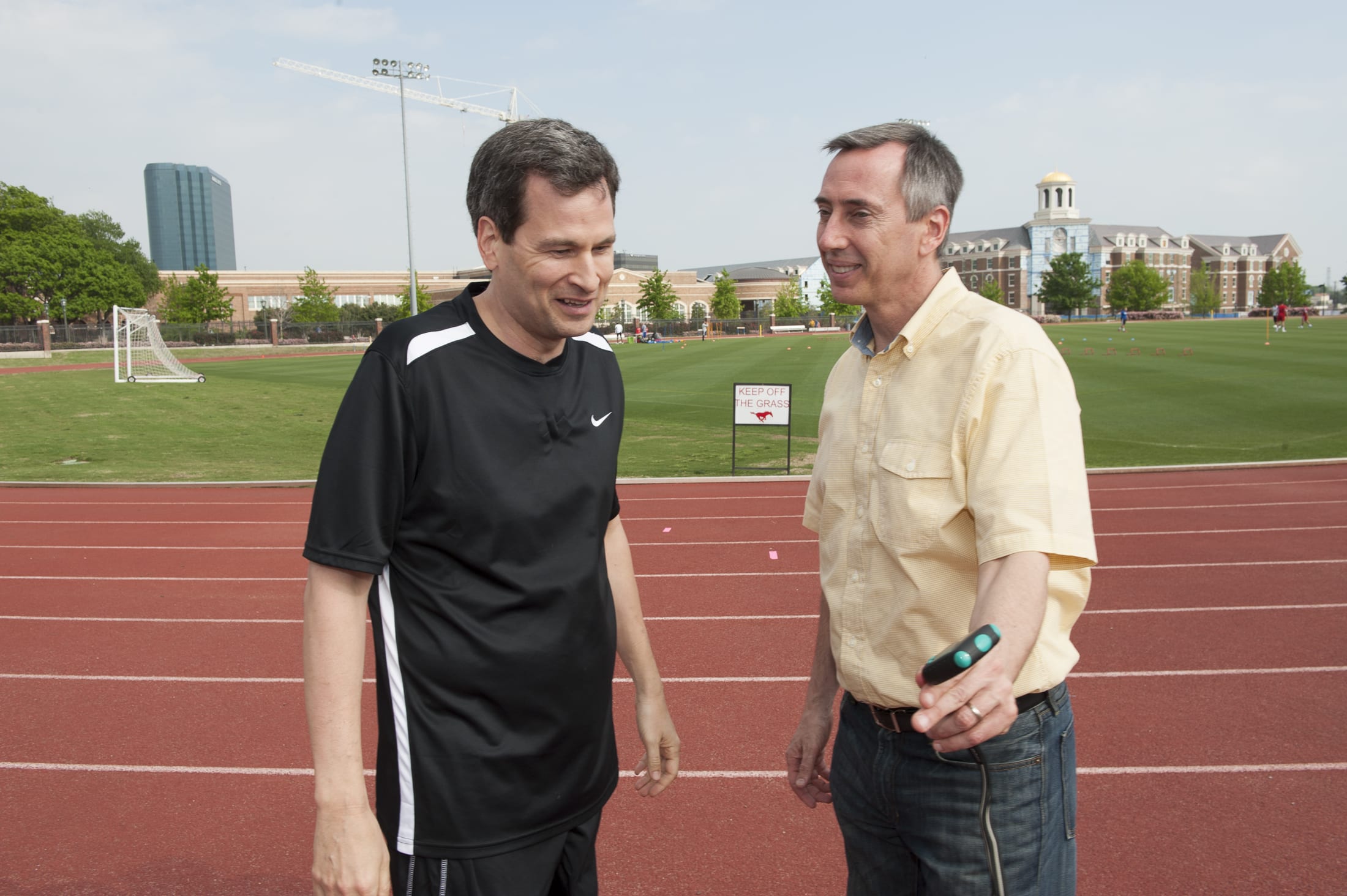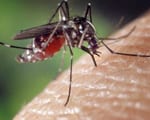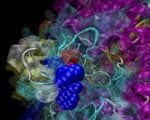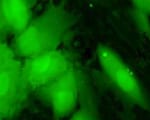BioNewsTexas covered the research of SMU biomechanics researcher Peter G. Weyand, who was featured on an episode of the PBS series “NOVA.” NOVA host David Pogue explored the biological and physical limits of speed on the Wednesday, Oct. 16, 2013 broadcast, “Making Stuff: Faster.”
Weyand, associate professor of applied physiology and biomechanics in SMU’s Annette Caldwell Simmons School of Education and Human Development, is one of the world’s leading scholars on the scientific basis of human performance. His research on the importance of ground forces for running speed established a contemporary understanding that spans the scientific and athletic communities.
In particular, his finding that speed athletes are not able to reposition their legs more rapidly than non-athletes debunked a widespread, but baseless belief. Rather, Weyand and colleagues demonstrated sprinting performance is largely set by the force with which one presses against the ground and how long one applies that force.
This work provided the understanding that enabled Weyand and colleagues to investigate the influence of prosthetic limbs on sprint running performance.
“The NOVA segment demonstrates the power of science to identify and improve performance capabilities. This is particularly exciting in an era in which electronic technologies allow discoveries to be applied quickly, broadly and on mobile platforms,” Weyand says. “I believe we are on the cusp of an unprecedented opportunity to responsibly and effectively advance performance training tools and practices.”
EXCERPT:
By Charles Moore
BioNewsTexas
What amazing new inventions will revolutionize our lives in the near future — how we compute, commute, and tackle health & safety? What is is the cutting-edge “stuff” powering the next wave of science and tech innovation?Will it be levitating trains; self-driving cars; wing-flapping hummingbird drones; supercomputing machines; fish slime stronger than bulletproof Kevlar, ultra-fast sailboats; bomb-sniffing plants; firefighting goo; swarms of flying robots? Civilization is built on the human ability to invent — to create new materials and technologies from the raw materials of the earth.
So what will the stuff of the future be made of? New York Times technology correspondent and best-selling author David Pogue will guide viewers through a new generation of cutting-edge materials that is powering a next wave of scientific and technological innovation in a four-part NOVA series: “MAKING STUFF: Faster, Wilder, Colder, Safer” premiering on consecutive Wednesday nights on October 16, 23, 30 and November 6, at 9pm ET/8c on PBS (check local listings).
In the premiere episode, “MAKING STUFF: Faster,” In “Making Stuff Faster,” Mr. Pogue wants to find out how much we can tweak physiology and engineering to move humans and machines even faster. He investigates everything from lightning-fast electric muscle cars to ultra-sleek sailboats to ultra-fast cameras and quantum teleportation. Mr. Pogue meets with Dr. Peter Weyand, Associate Professor of Applied Physiology and Biomechanics at Southern Methodist University in Dallas’s SMU Annette Caldwell Simmons School of Education and Human Development. Dr. Weyand, introduced as a professor of speed, explains how we can be faster. His lab at SMU (a high-tech facility equipped with superfast cameras) helps him on his singular mission: to make humans faster. Dr. Weyand’s work has led him to believe that the force of steps when we run is the key to human speed and, in a unique experiment, and he demonstrates to NOVA viewers how a complete and utter amateur like David Pogue can have off significant amounts of time off the clock by adjusting the way he runs. NOVA also explores important questions: Is it possible to go too fast? Have we hit a point where innovation outpaces our human ability to keep up?
SMU is a nationally ranked private university in Dallas founded 100 years ago. Today, SMU enrolls nearly 11,000 students who benefit from the academic opportunities and international reach of seven degree-granting schools. For more information see www.smu.edu.
SMU has an uplink facility located on campus for live TV, radio, or online interviews. To speak with an SMU expert or book an SMU guest in the studio, call SMU News & Communications at 214-768-7650.


 The Undying Radio: Familiarity breeds content when it comes to listeners and music
The Undying Radio: Familiarity breeds content when it comes to listeners and music Mosquito indexing system identifies best time to act against potential West Nile Virus outbreaks
Mosquito indexing system identifies best time to act against potential West Nile Virus outbreaks Modeling the human protein in search of cancer treatment: SMU Researcher Q&A
Modeling the human protein in search of cancer treatment: SMU Researcher Q&A Sweden, SMU psychologists partner to launch parenting program that reduces child abuse
Sweden, SMU psychologists partner to launch parenting program that reduces child abuse Chemical probe confirms that body makes its own rotten egg gas, H2S, to benefit health
Chemical probe confirms that body makes its own rotten egg gas, H2S, to benefit health Study: High-volume Bitcoin exchanges less likely to fail, but more likely to suffer breach
Study: High-volume Bitcoin exchanges less likely to fail, but more likely to suffer breach Musicians who learn a new melody demonstrate enhanced skill after a night’s sleep
Musicians who learn a new melody demonstrate enhanced skill after a night’s sleep